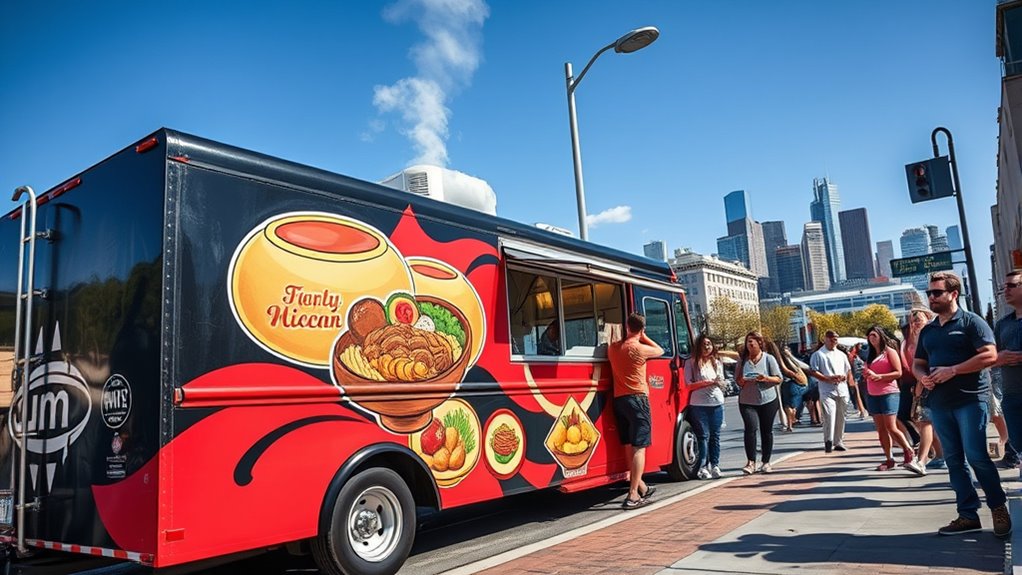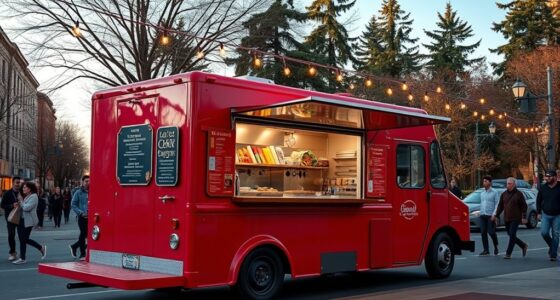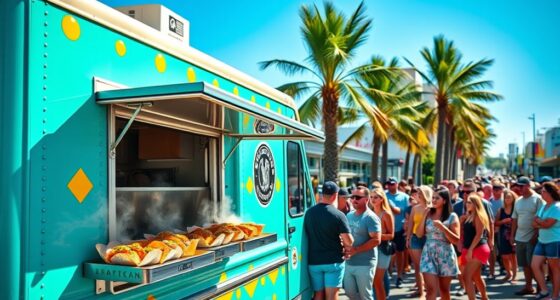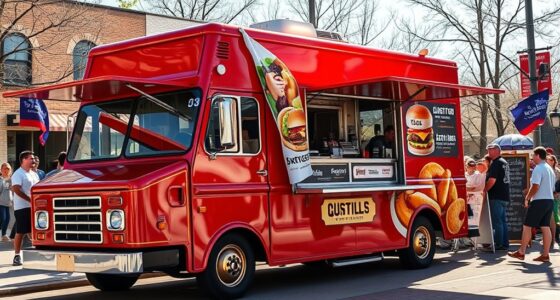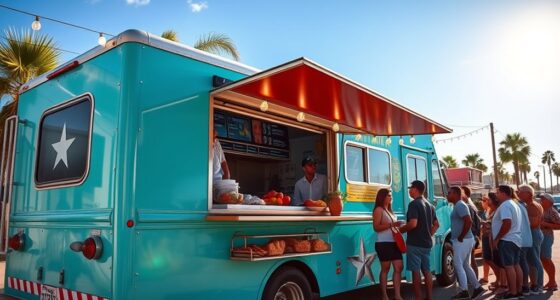To start a food truck in Denver, CO, you need to understand local regulations and obtain necessary permits. Develop a unique menu featuring local flavors, and find a suitable shared kitchen or truck. Budget carefully and explore financing options like microloans. Focus on effective marketing through social media, engaging food bloggers, and participating in community events. If you’d like more tips on steering through permits, equipment, and promotion strategies, keep exploring to build your successful food truck venture.
Key Takeaways
- Obtain necessary permits and licenses through Denver’s official permit portal, ensuring compliance with local health and zoning regulations.
- Secure a suitable shared kitchen or commercial space that meets licensing and sanitation standards.
- Develop a unique menu featuring local ingredients and plan pricing strategies to attract Denver’s diverse food scene.
- Explore financing options like microloans or leasing to fund your truck, equipment, and initial inventory.
- Build brand awareness by participating in festivals, collaborating with local bloggers, and engaging customers via social media.
Starting a Food Truck Business

Starting a food truck business in Denver can be an exciting and profitable venture if you plan carefully. To get started, focus on building your brand and menu to stand out at food truck festivals, which are popular event opportunities for exposure. These festivals attract large crowds enthusiastic to try diverse cuisines, giving you a chance to showcase your offerings. Additionally, consider catering opportunities to generate steady income and expand your reach beyond festivals. Reach out to local businesses, events, and private parties to offer catering services. Developing relationships with event organizers and consistently delivering quality food will help you build a solid reputation. With strategic planning and active participation in food festivals and catering, you’ll increase your chances of success in Denver’s vibrant food scene. Incorporating sound recording techniques into your promotional videos or live events can further enhance customer engagement and brand recognition.
Understanding Local Requirements

To get your food truck up and running in Denver, you need to understand the local requirements. This includes completing the online permit application, passing a food safety inspection, and parking in designated street zones. Knowing these steps helps you stay compliant and avoid delays. Additionally, familiarizing yourself with hydrotherapy techniques can be beneficial if you plan to incorporate wellness elements or offer health-focused menu options.
Online Permit Application Process
Navigating Denver’s online permit application process is straightforward once you understand the local requirements. To start, visit the city’s official website and locate the permit portal. The permit process involves completing an online application where you’ll provide details about your food truck, menu, and operational plans. Make sure you have all necessary documents ready, such as proof of business registration and insurance. Double-check that your application aligns with Denver’s zoning and health regulations. Submit your online application and pay any applicable fees electronically. After submission, monitor your email for updates or additional requests from city officials. Completing this permit process online saves time and helps you stay organized, bringing you closer to launching your food truck in Denver.
Food Safety Inspection Checklist
Understanding Denver’s Food Safety Inspection Checklist is essential to guarantee your food truck meets all local health standards. This inspection checklist outlines specific requirements for maintaining food safety, including proper sanitation, temperature controls, and safe food storage. You’ll need to verify all equipment is clean, surfaces are sanitized regularly, and that food is stored at appropriate temperatures to prevent contamination. The checklist also emphasizes personal hygiene practices for staff, proper waste disposal, and pest control measures. Familiarizing yourself with these requirements beforehand allows you to prepare thoroughly for inspections and avoid violations. Staying compliant not only protects your customers but also helps you operate smoothly within Denver’s health regulations. Regularly reviewing the inspection checklist keeps your food safety standards high and your food truck in good standing.
Designated Street Parking Zones
Knowing where you can legally park your food truck in Denver is essential for staying compliant with local regulations. Denver designates specific street parking zones where food trucks are permitted, and understanding these areas helps you avoid fines or penalties. Pay close attention to parking regulations posted on street signage, which clearly indicate permitted hours and zones. Some zones may restrict parking during certain times or require special permits. Always verify signage before parking to ensure conformity. Designated street parking zones are often located in high-traffic areas, but rules can vary by neighborhood. Staying informed about street signage and parking regulations ensures your food truck operates smoothly and avoids unnecessary legal issues. Compliance is key to building a successful presence in Denver’s vibrant food scene.
Setting Up Your Base of Operations
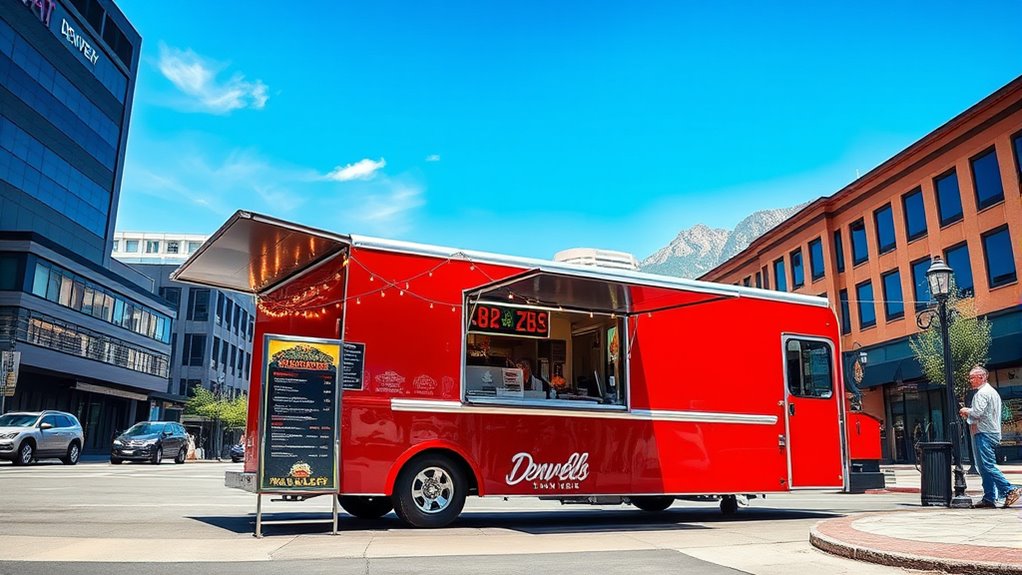
When setting up your base of operations, you’ll need to contemplate shared kitchen licensing requirements to stay compliant. Choosing the right custom kitchen equipment is essential for efficiency and food safety. Ensuring these elements are in place will help your food truck run smoothly and meet Denver’s regulations. Additionally, understanding the proper equipment maintenance practices can extend the lifespan of your appliances and ensure consistent performance.
Shared Kitchen Licensing Requirements
Are you aware of the licensing requirements for shared kitchens in Denver? To operate smoothly, you must ensure your shared kitchen meets local licensing compliance standards. Denver requires shared kitchens to obtain a food establishment license, which involves inspections and adherence to health and safety standards. You’ll need to submit an application detailing your kitchen’s layout, equipment, and sanitation practices. It’s important to keep documentation updated and cooperate with city inspectors to maintain licensing compliance. Additionally, shared kitchens must follow specific food safety protocols, including proper storage, cleanliness, and employee hygiene. Failing to meet these requirements could result in fines or suspension of your license. Staying informed and proactive guarantees your base of operations remains compliant and ready for your food truck venture.
Custom Kitchen Equipment Selection
Choosing the right equipment is essential to creating an efficient and compliant shared kitchen. Your custom kitchen equipment selection should focus on durability, safety, and functionality to meet Denver’s health codes. Think about the specific menu items you’ll serve and select appliances that streamline your workflow. Properly chosen equipment saves time and reduces operational costs, making your food truck more profitable. Prioritize versatile cooking devices, refrigeration units, and prep stations that fit your space. Additionally, consider energy-efficient options to lower utility bills. Remember, well-planned equipment selection helps guarantee compliance with local regulations and supports smooth daily operations. When designing your custom kitchen, keep these essentials in mind to build a reliable, efficient food truck base of operations.
- Durable cooking appliances
- Refrigeration units
- Prep stations
- Ventilation systems
- Energy-efficient devices
Budgeting and Financing Your Food Truck
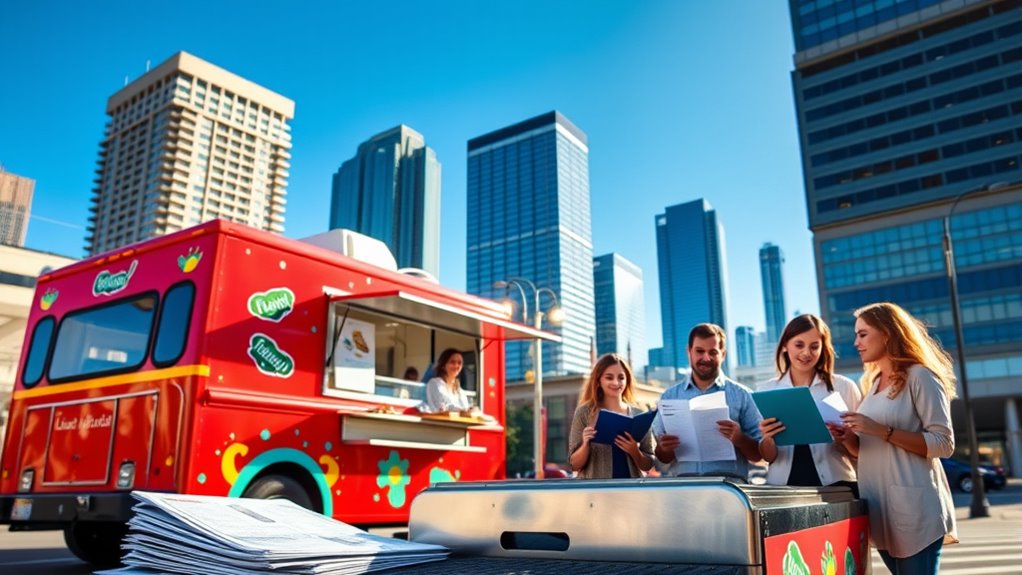
Getting your food truck off the ground starts with understanding your costs, like the initial vehicle purchase. You can explore small business microloans to help cover expenses and keep your budget manageable. Don’t forget to factor in commercial vehicle insurance requirements to protect your investment and stay compliant. Additionally, establishing a solid budget plan can help you allocate resources efficiently and ensure financial stability as you launch your business.
Initial Vehicle Purchase Costs
The initial cost of purchasing a food truck can vary widely depending on factors like size, condition, and features, making it essential to establish a clear budget early on. You might consider options like vehicle financing, which allows you to spread out payments over time, or equipment leasing, which can reduce upfront costs. Be prepared for different price ranges based on your needs:
- New trucks with custom features
- Used trucks in good condition
- Basic models versus fully-equipped units
- Upfitting and customization costs
- Financing and leasing options
Understanding these factors helps you plan your investment wisely. While vehicle financing and equipment leasing can ease cash flow, always factor in additional expenses like registration and insurance to stay within your budget.
Small Business Microloans Available
Small business microloans can be a valuable resource when financing your food truck, especially if you’re working with a limited budget. These microloan programs offer smaller amounts of funding, making them accessible for startups and entrepreneurs like you. Unlike traditional small business loans, microloans often have more flexible qualification requirements and quicker approval processes. They can help cover costs such as equipment, initial inventory, or licensing fees. Many community lenders, nonprofit organizations, and government programs provide microloan options tailored to small businesses. By exploring these microloan programs, you can secure the necessary funds without taking on overwhelming debt. It’s a practical way to get your food truck up and running as you build your customer base in Denver.
Commercial Vehicle Insurance Requirements
Are you aware of the specific commercial vehicle insurance requirements needed to finance your food truck? Ensuring you meet Denver’s insurance standards is essential for legal operation and securing financing. You’ll need proper insurance documentation to prove coverage, which protects you and others on the road. Additionally, your vehicle registration must be current and reflect your food truck’s details. Insurance policies should include liability coverage, comprehensive, and collision protection tailored for commercial vehicles. Some lenders may also require additional coverage, like roadside assistance or custom equipment protection. Remember, having the right insurance documentation ready simplifies the registration process and helps you avoid fines. Staying compliant with these requirements keeps your food truck operational and financially sound from the start.
Designing Your Menu and Pricing Strategy
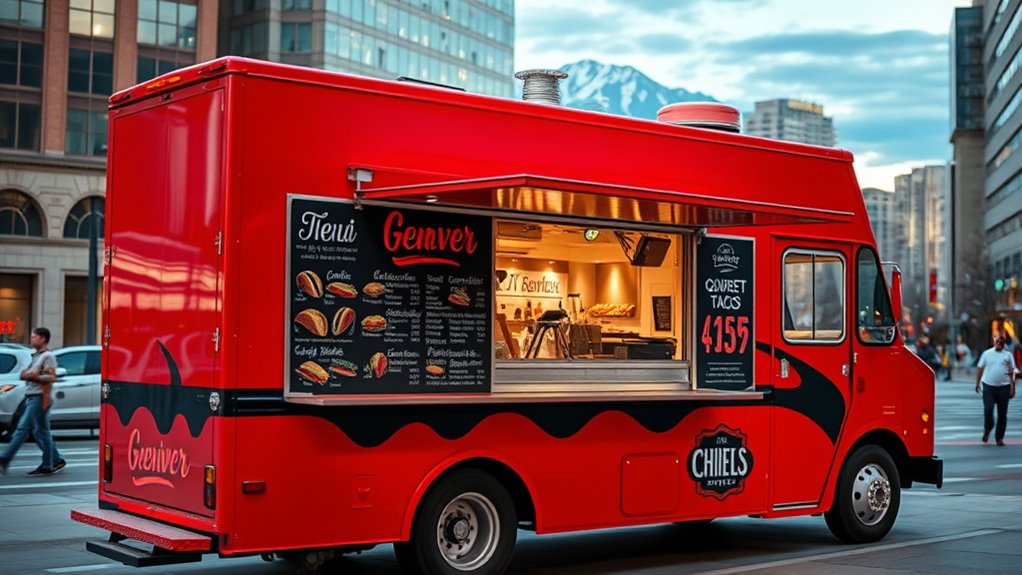
To stand out in Denver’s vibrant food scene, you should focus on creating a menu that highlights local flavors and ingredients. Adjust your prices dynamically based on demand to attract more customers during busy times and maximize profits. This approach keeps your offerings fresh and your pricing competitive, helping your truck succeed. Incorporating farmhouse-inspired elements into your food truck design can also evoke a cozy, inviting atmosphere that encourages repeat customers.
Locally Inspired Menu Innovations
Creating a locally inspired menu for your Denver food truck involves more than just selecting popular regional ingredients; it’s about crafting a unique experience that resonates with your community. Focus on locally inspired menu innovations by incorporating regional ingredient sourcing into your dishes. This not only supports local farmers but also creates authentic flavors that appeal to customers seeking a taste of Denver. Consider seasonal ingredients to keep your menu fresh and exciting. Experiment with classic Denver favorites, like green chili or Rocky Mountain trout, and give them a modern twist. Use these ideas to stand out and build a loyal customer base:
- Incorporate Denver’s signature ingredients like hatch chiles
- Highlight seasonal, locally sourced produce
- Create fusion dishes blending regional flavors
- Offer limited-time specials based on local harvests
- Emphasize freshness and authenticity
Dynamic Pricing Based on Demand
Implementing dynamic pricing based on demand allows your Denver food truck to maximize revenue and better meet customer expectations. With demand-based pricing, you adjust your menu prices in real-time depending on factors like location, time of day, or special events. This approach helps you capitalize on busy periods when customers are willing to pay more, while offering discounts during slower times to attract foot traffic. To succeed, monitor sales patterns and customer flow closely, then tweak your prices accordingly. Dynamic pricing ensures you’re not leaving money on the table or alienating customers with static prices. By employing demand-based pricing strategies, you create a flexible, profitable pricing model that responds to market conditions and enhances your food truck’s overall performance.
Technology and Operations
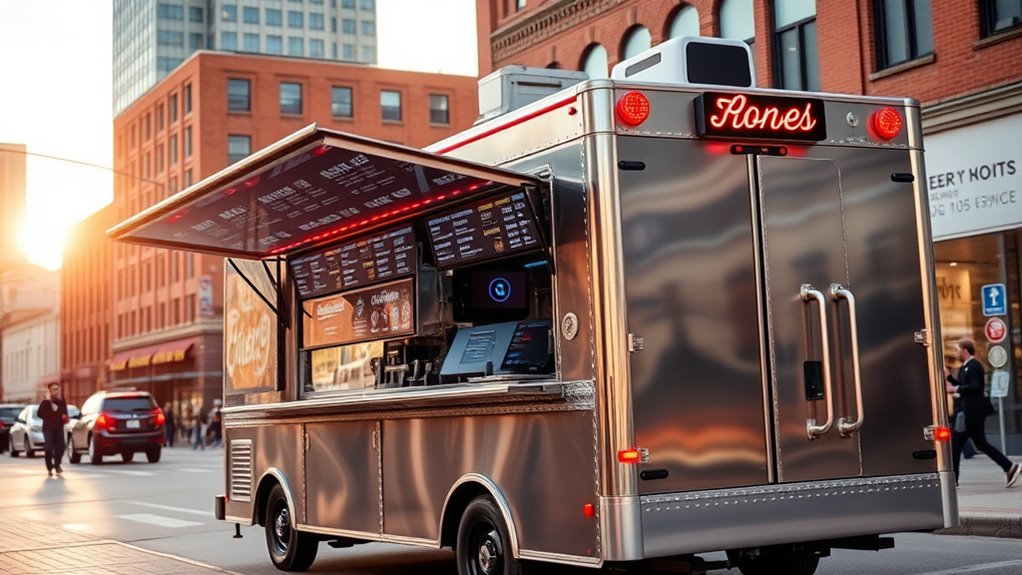
You’ll want to contemplate implementing wireless contactless payment options to make transactions quick and safe for your customers. A mobile POS system can streamline orders and reduce wait times, while stock tracking helps you manage inventory efficiently. These technologies keep your operations smooth and ensure a better customer experience.
Wireless Contactless Payment Options
Wireless contactless payment options have become essential for food trucks seeking to enhance customer convenience and streamline operations. By offering contactless payments, you reduce transaction times and improve the overall customer experience. Wireless transaction options allow for quick, secure payments using smartphones or contactless cards, minimizing physical contact and handling cash.
Consider these options:
- NFC payment systems like Apple Pay and Google Pay
- RFID-enabled card readers
- QR code scanning for mobile payments
- Mobile point-of-sale (POS) devices
- Contactless debit and credit card readers
Implementing these technologies helps you stay competitive and meet customer expectations for fast, safe transactions. Investing in contactless payments not only boosts efficiency but also builds trust with customers who prefer modern, hygienic payment methods.
Mobile POS and Stock Tracking
As contactless payment systems become more common, streamlining daily operations with mobile POS solutions and accurate stock tracking can substantially boost your food truck’s efficiency. Mobile payments enable quick transactions, reducing wait times and improving customer experience. Pair this with effective inventory management to prevent stockouts and overstocking. Using a mobile POS system, you can effortlessly track sales and inventory in real-time, making restocking more accurate and timely. Consider this table to see the benefits:
| Benefit | Feature | Impact |
|---|---|---|
| Faster Payments | Mobile payments integration | Shorter wait times |
| Better Inventory Control | Real-time stock tracking | Reduced waste |
| Increased Efficiency | Seamless operations | More sales opportunities |
Implementing these tech solutions simplifies operations and keeps your truck running smoothly.
Marketing and Growing Your Presence
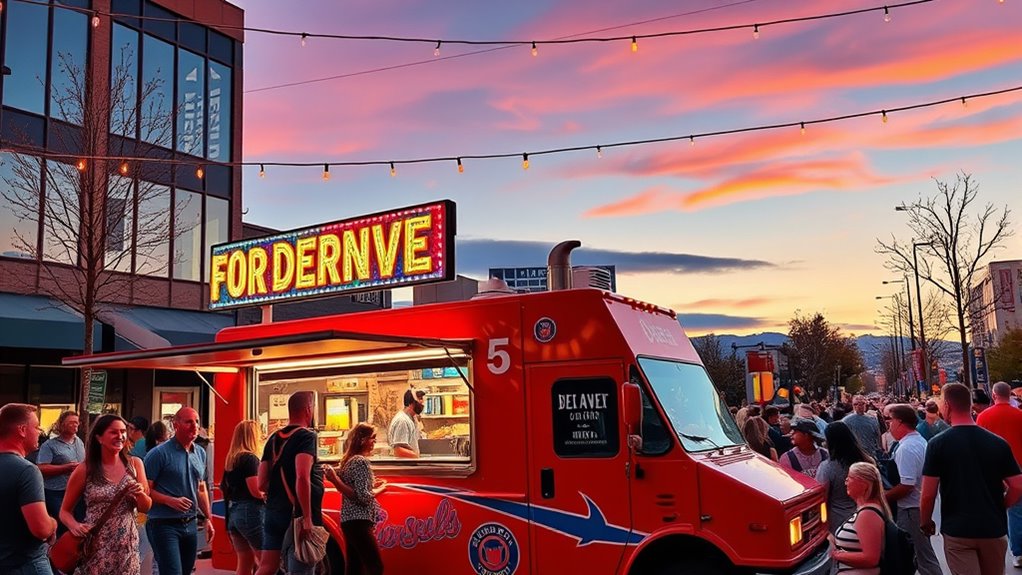
Using popular event scheduling apps can help you reach more customers and keep your truck visible in Denver. Engaging local food bloggers is a great way to build buzz and attract new audiences. Together, these strategies can substantially boost your presence and grow your customer base.
Popular Event Scheduling Apps
Have you considered how popular event scheduling apps can boost your food truck’s visibility and attract more customers? These apps streamline event planning and help you reach wider audiences. With features like calendar integration, push notifications, and social sharing, you can easily promote upcoming appearances. Using event scheduling apps guarantees you stay organized and maximize your presence at local festivals, markets, or private events. Their app features allow you to customize event details, track attendance, and analyze customer engagement. By leveraging these tools, you can build buzz and keep customers informed about your schedule.
- Easy-to-use calendar interface
- Automated reminders for upcoming events
- Social media sharing options
- Attendance tracking tools
- Real-time updates for customers
Engaging Local Food Bloggers
Engaging local food bloggers can considerably boost your food truck’s visibility and attract a broader audience. Reach out to bloggers who focus on food photography and Denver’s culinary scene. Invite them to sample your menu and share their honest reviews, emphasizing vibrant food photography that highlights your dishes’ appeal. Encourage social media engagement by asking bloggers to tag your truck and use relevant hashtags, increasing your reach. Building relationships with these influencers helps generate authentic content that resonates with their followers. Consistent collaboration can turn bloggers into brand ambassadors, driving more foot traffic and online buzz. Remember, genuine interactions and quality visuals are key to making your food truck stand out in Denver’s competitive market.
Local Networking Opportunities Boost Success
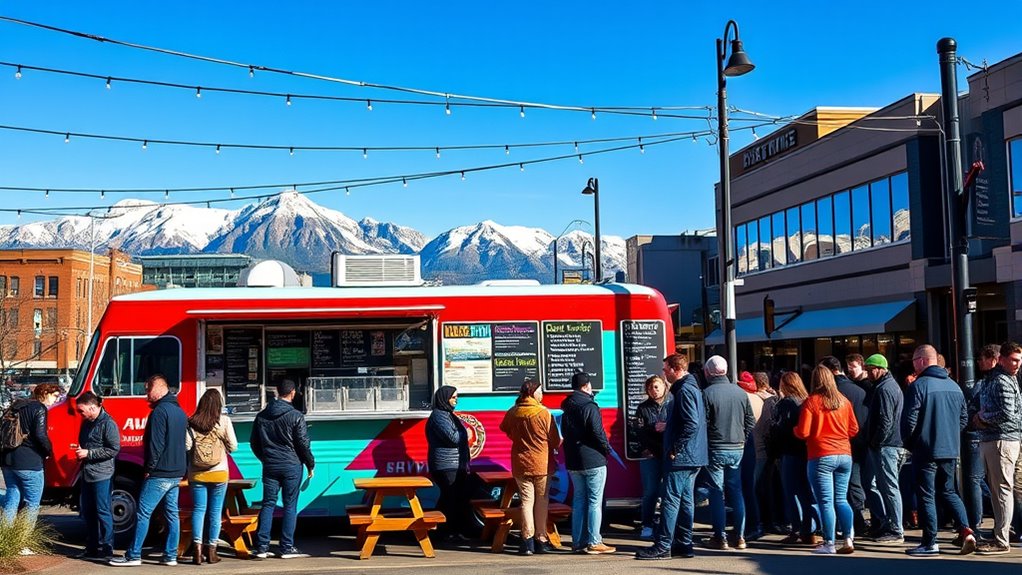
Local networking opportunities play a crucial role in helping food truck owners in Denver thrive. By engaging in community partnerships and attending networking events, you can build valuable relationships that boost your visibility and sales. These connections often lead to collaborations, shared resources, and word-of-mouth promotion, all essential for growth. Participating in local meetups or industry mixers helps you stay informed about upcoming events and trends. Establishing strong ties with other vendors and community groups can open doors to prime locations and special events. Making the effort to connect regularly ensures you’re top of mind when new opportunities arise.
- Community partnerships for mutual support
- Attending regular networking events
- Collaborating with local businesses
- Participating in community festivals
- Sharing resources and knowledge
Frequently Asked Questions
What Permits Are Required Specifically for Denver’s Food Trucks?
You need several permits to operate a food truck in Denver. First, obtain a Food Truck Permit from Denver’s Department of Environmental Health, ensuring your truck meets food safety standards. You’ll also need a Denver Business License and a Mobile Food Vendor Permit, which covers your sales location. Check Denver food regulations closely, as you might require additional permits for specific areas or events. Staying compliant keeps your food truck running smoothly.
How Can I Find the Best Locations for My Food Truck in Denver?
Think of Denver’s streets as a bustling river of opportunity. To find the best spots, you’ll navigate parking regulations like a skilled captain, avoiding no-go zones. Observe customer demographics like a detective, noting where your target crowd gathers—near offices, parks, or events. Test different locations, watch their flow, and adapt. Your perfect spot awaits where parking rules align with customer flow, turning passersby into loyal patrons.
Are There Any Local Food Truck Festivals or Events in Denver?
Yes, Denver hosts several local food events and festivals perfect for networking. You should check out the Denver Food Truck Festival and the Colorado Food & Wine Festival, which attract large crowds and industry professionals. Attending these events helps you connect with other food truck owners and potential customers. Participating in local food events also boosts your visibility, making it easier to establish your brand and grow your business.
What Are Common Challenges Faced by Food Truck Owners in Denver?
You face hurdles like tight parking regulations that feel like maneuvering a maze, making it tough to find spots. Customer retention can be a constant battle, like trying to catch fireflies in a jar—you’re always seeking ways to keep them coming back. Balancing city rules with your desire to serve fresh, delicious food requires resilience and creativity, turning obstacles into opportunities on Denver’s vibrant streets.
How Does Denver’s Weather Impact Food Truck Operations Year-Round?
Denver’s weather impacts your food truck operations year-round by demanding adaptability. You’ll need to update your seasonal menu to suit changing conditions and customer preferences, especially during harsh winters with snow and cold temperatures. Rainy and windy days might reduce foot traffic, so you should prepare for slower sales. Staying flexible and responsive guarantees you keep customers happy despite Denver’s unpredictable weather, making your food truck successful throughout the year.
Conclusion
Starting your food truck in Denver can be a rewarding adventure. Imagine launching your truck, offering unique tacos, and drawing crowds at the city’s vibrant events. With proper planning, local permits, and a strong marketing strategy, you’ll build a loyal customer base. Like Sarah did with her Denver-based vegan food truck, your passion combined with smart business decisions can turn your dream into a thriving reality. Get started today and make your mark on Denver’s food scene!
